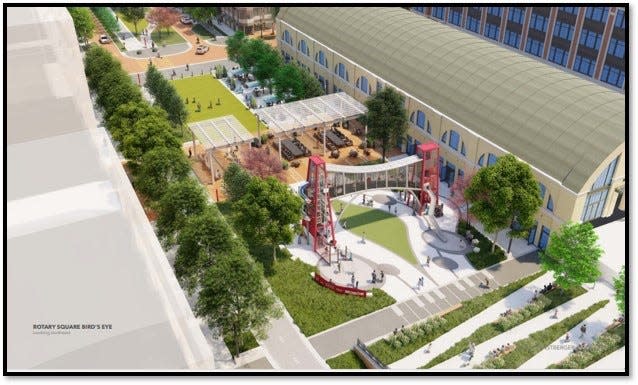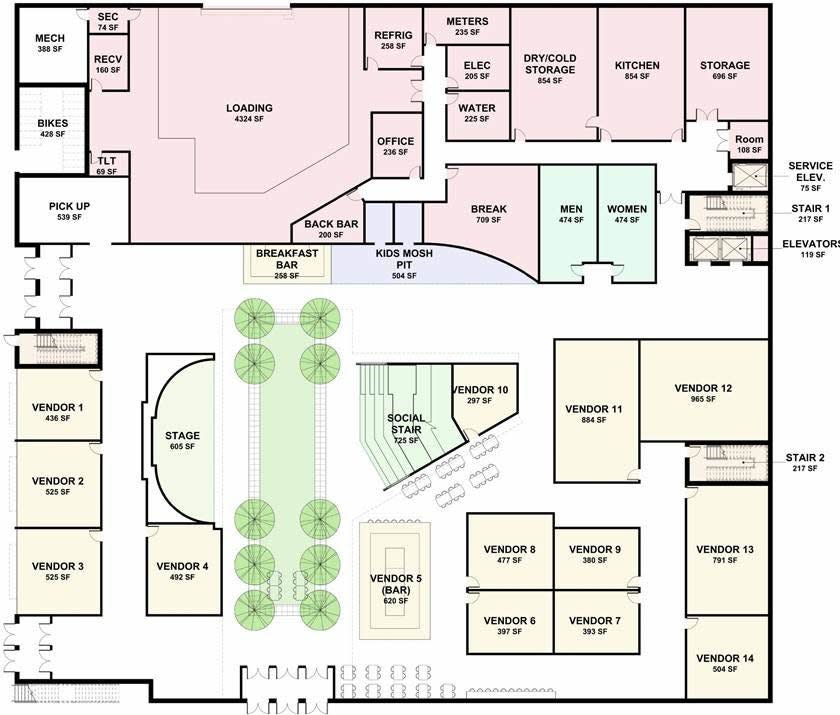Carmel plans arboretum-like food hall with playground on the Monon

Move over Garage Food Hall at Bottleworks. Step aside, Yard at Fishers District. There could be a new food emporium in town.
And it has a chance to be better than anything else out there, Carmel officials said
Carmel and property owner Pedcor are considering a cavernous multi-purpose food hall and public space along the Monon Trail with restaurant counters and retailers, a central lawn, an entertainment stage, indoor and outdoor playgrounds, a rooftop deck and a botanical section as part of a $47 million development.
“This could be a game-changer for our county,” said City Councilor Jeff Worrell. “An amenity that is a natural winter complement to the Monon Trail.”
'It has elevated the city': Hotel Carmichael eyes expansion, claims big wins
A preliminary design, which could change, shows a long fieldhouse-style structure on the south end of the recently razed Monon Square shopping center, once home to Union Brewing and a slew of other small businesses.
“This project is a completely unique thing that nobody has proposed,” Carmel Redevelopment Commission Executive Director Henry Mestetsky said, “a place where people want to spend time whether they’re hungry or not.”
Mestetsky said the food hall would fill a void in Carmel’s public gathering spaces, an indoor site that could be used year-round, as opposed to a seasonal attraction such as Christkindlmarkt or warm weather venue, like Midtown Plaza.
“We have tremendous outdoor civic space but not an indoor one, not a free one, where you can go without buying something if you don’t want,” he said. “It doesn’t exist much anywhere in American cities. We want it to be more than a food hall.”
A regional draw
Mestetsky cited the success of the Garage at the Bottleworks mixed use development on Massachusetts Avenue in Indianapolis as an example of the growing public appetite for food halls. And he said a Carmel hall could even draw customers from the northside who might otherwise drive to the Garage.
Carmel’s version, called the Union at Monon Square, would be the south section build-out of the former strip mall between Rangeline Road and the Monon Trail and north of City Center Drive. Besides the food hall, the southern section would have 190 apartments, offices and a 600-space parking garage.
The food hall would occupy the first two stories of a five-story building, with the top three floors as offices. It would include:
Eight hot food counters, preferably local, artisan purveyors, and six retail or specialty food vendors, selling foods such as gourmet popcorn, olive oil, cupcakes or deli foods.
A public green in the center.
"Social stairs,” or open, wide staircases designed for seating, where visitors can relax while watching over of activity in the hall or their children playing.
An entertainment stage for live acts and a large screen television.
A playground for children inside and outside on a grassy area next to the Monon.
Real and artificial trees and plants inside, replicating an arboretum.
Upstairs event spaces for smaller weddings or corporate events.
A rooftop deck for events.

Grants sought
Officials cautioned that the $47 million project, at this point, would be contingent on receiving a $10 million grant from the Indiana Regional Economic Acceleration and Development Initiative (READI grants) and a $7 million Hamilton County Tourism grant.
Officials would also use an $8 million construction loan and $22 million in tax-increment financing bond proceeds from the larger Monon Square development project, which includes apartments, condos and offices on the north side of the property.
The Indiana Economic Development Corporation earlier this month awarded the Central Indiana Regional Development Authority a $45 Million READI 2.0 grant, based on a general vision for the region. Now, the towns, cities and counties, including Carmel, will submit their individual project applications to CIRDA, which will send them to the IEDC for selection.
Councilor Adam Aasen said he likes Carmel’s chances at a READI grant, which are designed to spark regional economic activity and foster governmental cooperation.
“This is a unique submission that includes a lot of partners, on the private side, county tourism and the parks department,” he said. ”And it could attract people from outside the area to spend money.”
Pedcor, which owns part of the property and is a partner with the city on the upscale Hotel Carmichael, could team up again on the food hall or another developer could get involved.
The council unanimously approved a non-binding resolution in support of pursuing the project further if it gets the grants. Even without outside funds the council could go ahead using other cash.
More: As State Road 37 project nears restart at 141st Street, some Fishers shops hang by thread
But neither Aasen nor Worrell wanted to speculate on whether that was likely.
“There are a lot of big ‘ifs’,” Worrell said. “We should carefully look at it this if we consider it without grant funding. It would not be an easy lift.”
Food halls thriving
Visit Hamilton County, the county’s tourism office, said it would conduct a cost analysis study if the project moves forward. Vice President and Chief Strategy Officer Karen Radcliff said the office did some research for Carmel and found that food halls can be effective revenue generators.
“They are increasingly popular and can be an asset,” she said. The most successful are those that lots of people can easily walk to in populated areas like downtown and Midtown Carmel, she added.
Carmel’s location is not only walkable but the 600-car parking garage would have at least 75% free parking spaces, in addition to mostly free parking at the northern section garage, Mestetsky said.
The number of food halls in the United States has increased dramatically in recent years, especially in mid-sized cities and suburbs, according to a “State of Food Halls, 2023,” a study led by Garrick Brown, of Brown Consulting.
Between 2019 and 2023, food hall operations increased from 220 to 340, with another 127 in construction or planning at the time. As restaurants have struggled since the Coronavirus pandemic, entrepreneurs have turned to the food halls, a lower-cost alternative, the study found.
Shared freezer, storage and kitchen space, along with savings because of smaller staffs and menus, keep expenses down.
The study found location and walkability were the key to success.
“This remains a high volume, low margin business that depends on optimal foot traffic,’ according to the study. “But poor site selection will remain near the top of the list for failed projects.”
The design of the hall is also important, according to Brown’s report.
“They’re carefully and strategically designed to engage the senses and create hyper efficiencies. They invite guests to linger. They provide for a wide range of programming.”
Radcliff said the tourism office is still reviewing whether to award Carmel the $7 million grant it is requesting.
Call IndyStar reporter John Tuohy at 317-444-6418. Email at john.tuohy@indystar.com and follow on X/Twitter and Facebook.
This article originally appeared on Indianapolis Star: Carmel plans arboretum-like food hall with playground on the Monon
